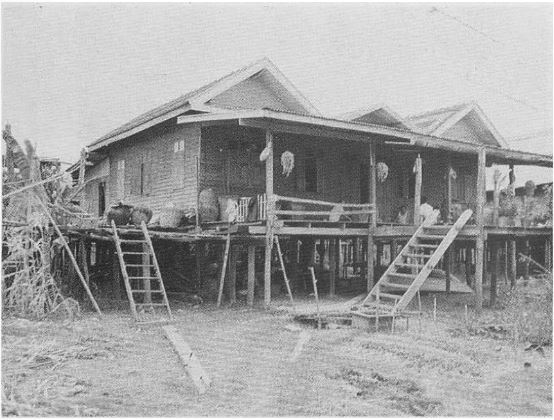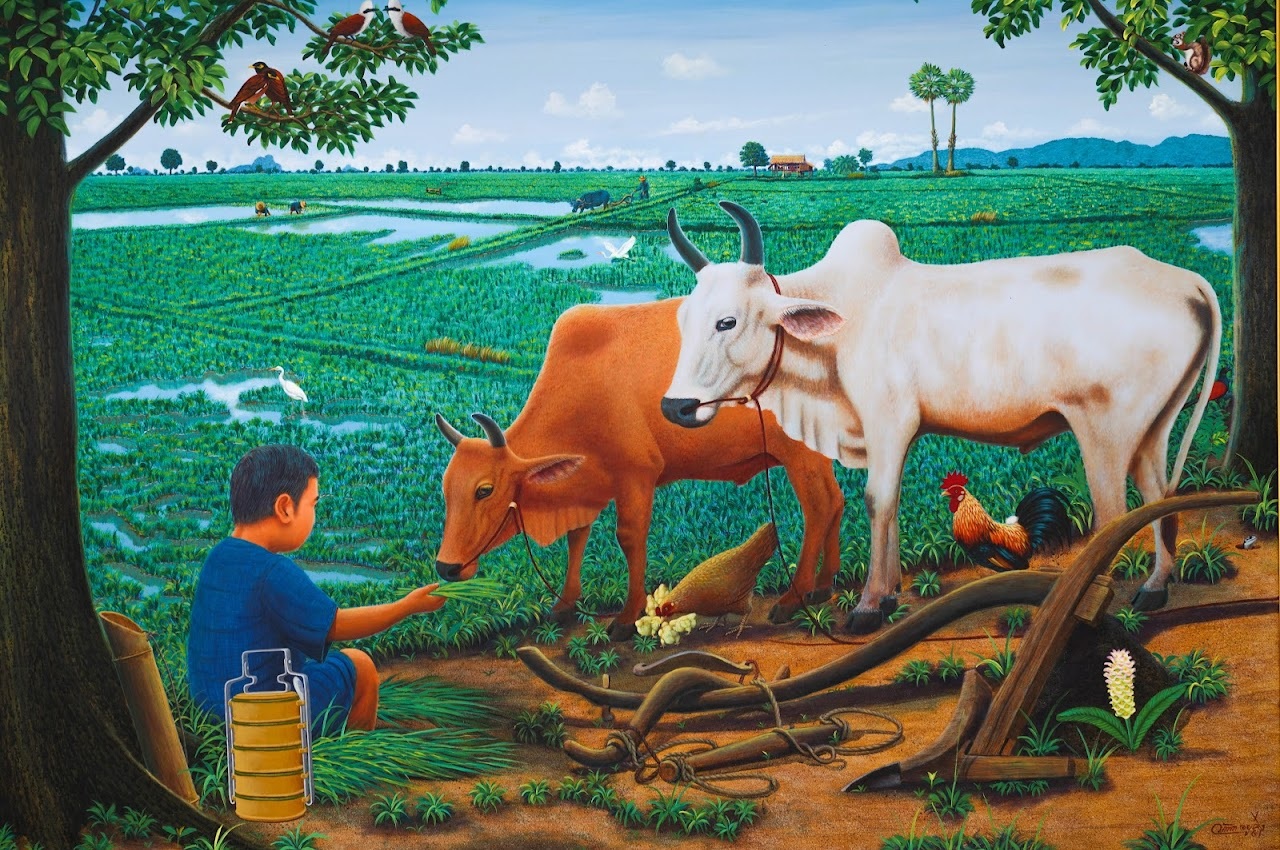
Famously known as Luangpu Wat Paknam, one of the most venerated Buddhist monks in the history of Thailand, Phramongkolthepmuni was born as Sodh Mikaewnoi on October 10, 1884 to the family of Ngeun and Sutjai Mikaewnoi, a rice merchant in the village of Songpinong, Suphanburi, a province 60 miles west of Bangkok, Thailand. Sodh was the second born of five siblings with an older sister, Dha, and three younger brothers, Sai, Phook and Samruam in order of birth.
birthplace in sketch
birthplace in past time
birthplace in present time
The family house was in the north of the Songpinong commune. The house was located on a peculiar piece of land resembling the shape of two lotus buds joined together, surrounded by water on all sides. It was positioned to the south of Wat Songpinong, a village temple on the opposite side of the canal. The family had two river barges and several crew members. They shipped rice between Songpinong and Bangkok, and sometimes Nakorn Chaisri, a district of Nakorn Pathom, two or three times a month.
Mother soodjai meekaewnoi
Sodh was an intelligent child with strong willpower. In whatever he set out to do he would always persevere until it was done and done well. When he was little he used to help his mother tend the oxen, and regardless of his young age he would plunge fearlessly into a neighbor's herd in order to retrieve missing oxen, no matter where they might have strayed or
how late into the night it might have been. He would never return empty-handed.

Sodh showed the signs of compassion even when he was very young. While helping his parents plough the rice fields each morning, as it neared midday, he would gaze up to check the position of the sun to note what time it was. His sister thought he was lazy, waiting for the time to take a break, but in fact he was watching for the appropriate time to relieve his ox. If he saw that the oxen had been overworked and had become tired, he would lead them off for a bath then let them loose to graze. Sodh helped his parents with their work until he was nine when he began his formal education with his uncle, a monk at Wat Songpinong.
In those days, before the establishment of state schools, monks were the only teachers, and Buddhist temples functioned as schools for people in the community. It was customary for a monk not to take residence in one place for too long. Thus, after only a few months, his uncle moved to another temple and Sodh followed. Subsequently, his uncle moved to a temple in Thonburi, across the river from Bangkok, sixty miles away from his native village. Because of the distance, Sodh did not follow his uncle but went on to continue his study at Wat Bang-pla, a temple in Nakorn Pathom Province, the home town of his father's side of the family. There, he studied Thai and Khom under the tutelage of Venerable Sab until he was able to read and write both languages fluently.
Sodh was fourteen when his father passed away. As the eldest son, the burden of running the family business and supporting his mother and siblings fell on his young shoulders. He took over his father's rice trading business and worked hard to grow the business. Sodh's earnestness, hard work and intelligence soon won the love and respect of his crew as well as his relatives. His business prospered and the family became well established.
Sodh was always keen on developing himself, never content with his own level of development. He would emulate the success of others and incorporate their good qualities onto himself.
A turning point in his life came when, in one trading trip to Bangkok in 1903, he sold all the rice in his boat and headed home with the empty barge and a large sum of money. The main river routes that he traveled were extremely treacherous so he took a detour through a remote waterway known as Klong1 Bang-Eetan. (1Klong a Thai word for canal) This was a narrow stretch of canal dreaded by boatmen because it was infested with pirates and bandits. Only a few lucky boats would manage to pass Bang-Eetan without being robbed or killed. Usually they would travel in a convoy for security.
That day, Sodh's boat was the only one in sight. Upon reaching this narrow stretch, the fear of death struck him. Sodh knew the strategy of the pirates: they would aim to attack the captain or the helmsman first to gain control of the boat. The person at the front of the boat would be in a safer position, as he could fight or escape. Sodh's survival instinct told him that he should switch his position from the helm to the front of the boat to avoid danger, so he ordered his crewman at the front to take his place at the helm.
Sodh had a rifle. He grabbed it and strode towards the bow as the boat gradually glided into a remote part of the canal.
Then a guilty conscience struck him.
He thought:
"All the crew gets from me for looking after this wretched barge is eleven or twelve Baht a month (equivalence of 50-60 cents in those days). As for me, I am the owner of the boat and I have all the money. If I hand down death to my less-than-fortunate workers I would be taking advantage of a fellow man. This is the wrong thing to do. The money is mine; the boat is mine; if someone should die it should be me. Let the workers escape so they can live to take care of their families."
He was ashamed for having made such a selfish move. He called the crewmen back to the oars and sat himself at the tiller with the rifle in his lap. Although he finally managed to pass
through the crisis in safety, the whole episode left him with a deep sorrow for his fellow men.
It was an awakening for him:
"Making a living is such a hard thing indeed, to go through such an ordeal just to avail oneself of a day's wage. Material wealth is so ingrained in a man's values that he loses touch with the reality and true purpose of life. Does society so despise the un-made man to ostracize him until he can earn himself riches? In the end everyone must die. My father has died. My relatives have died. And when they died they could take nothing with them. What is the point of having all these possessions when you can't take them with you to your grave? Everyone must die. One day, I, too, must die. Haven't learned from those who are dead?"
He pondered what he should do with his life. After much reflection he came to the conclusion that there was nothing more worthwhile for him to do than pursuing a life of purity by becoming a monk. Having made up his mind, he lit three sticks of incense, placed them between his palms, and made the following wish:
"Please don't let me die before I have a chance to ordain. Once I ordain it will be for life."